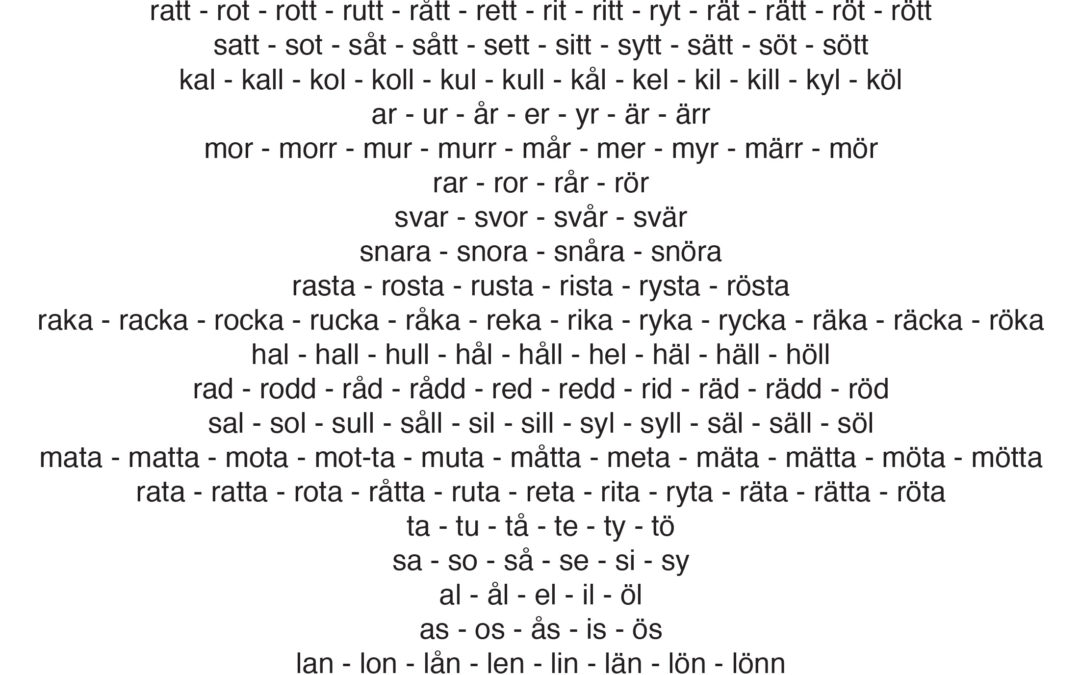by Sofi | 18,03,01 | ARTICLES, Language Learning, Pronunciation
1. Not teaching you the right pronunciation Swedish is a rhythmic language. There are many short syllables, and in each sentence, a few long syllables. A long syllable consists of a long vowel and a long consonant. Long means that it takes a long time to say. In glas... by Sofi | 18,02,04 | ARTICLES, Language Learning, Pronunciation, Swedish Language Training
Very recently, I was given a new learner. In order not to reveal anything about their identity, I cannot give you more details than that they needed to improve their Swedish pronunciation drastically, in order to save their career. Pronunciation is a sensitive topic.... 
by Sofi | 17,11,24 | ARTICLES, Language Learning, Pronunciation
Monster or mönster – what is the scariest to you? You know when you want to make that monster really frightening, and you end up calling it a pattern? There must be plenty of post-ignorant expats out there, laughing smugly at their idiotic co-patriots who are... 
by Sofi | 17,06,19 | ARTICLES, FEATURED, Featured: VOICES, Language Learning, Pronunciation, Vocabulary
It is late mid morning, and your Swedish colleague you are working together with, suddenly says: Hejurere? Jörenåt aja ätelunch nu? Jae ungri. You will need to answer with: Reelungt. Gårebra omja joinarej? Your colleague, a bit distracted on their phone, goes: Vasaru?... 
by Sofi | 17,06,16 | ARTICLES, FEATURED, Pronunciation, Swedish Language Training
There are some more complicated and some less complicated challenges when it comes to Swedish pronunciation. I have collected five particularities of the Swedish language, that should be rather easy to master technically, as soon as you have recognised their... 
by Sofi | 17,06,02 | ARTICLES, FEATURED, featured: SUMMER, Grammar, Swedish Geography, Vocabulary
If you have visited Sweden, and particularly the northern parts, you must have heard people talking about mygg, or myggor. Both would translate as [mosquitoes]. And the question you will ask your hosts is of course, what is the difference? Normally, referring... 
by Sofi | 17,06,02 | ARTICLES, Language Learning, Swedish Language Training, Vocabulary
These words are confusing and easy to mix up, also for advanced users of Swedish. The confusion often arises from the belief that these terms should be differentiated according to their meaning, whereas in fact it is not the meaning that is different, but how they are... 
by Sofi | 17,05,02 | ARTICLES, Expressions, FEATURED, Language Learning
Ten Swedish insect-related expressions you should master Why? Idiomatic expressions are useful in many ways. First of all, the will teach you something of the local culture or history. Second, remembering and knowing an expression by heart will help you to... 
by Sofi | 17,04,04 | Featured: VOICES, Swedish Language Training, Vocabulary
In most languages, there are prefixes or suffixes to make things smaller, and by that, cuter and more loved. In old Swedish, the suffix -ling or -ing was used, and we still see traces of this in words referring to baby animals, such as killing [kid] and gässling... by Sofi | 17,03,30 | Exams, NEWS & EVENTS, Uncategorised
Bee Swedish is launching a collaboration project with Yrkessvenska, helping international medical staff to validate their Swedish language skills to apply for a professional licence to practise in Sweden. Medical staff applying for a licence to practise in...






